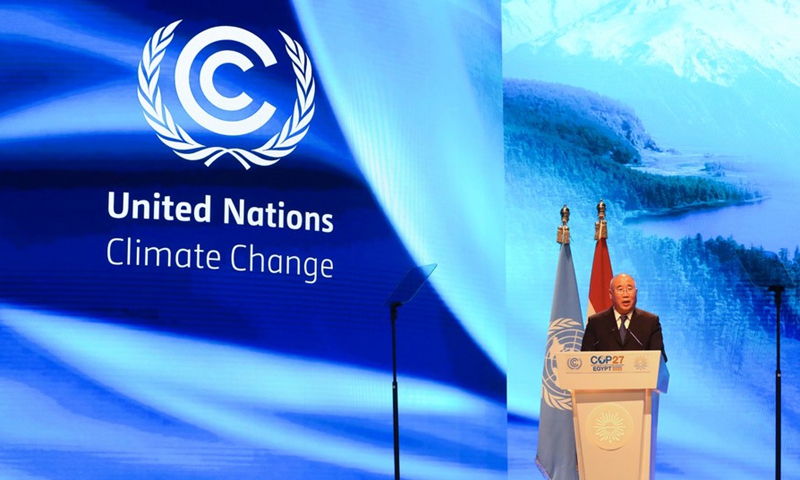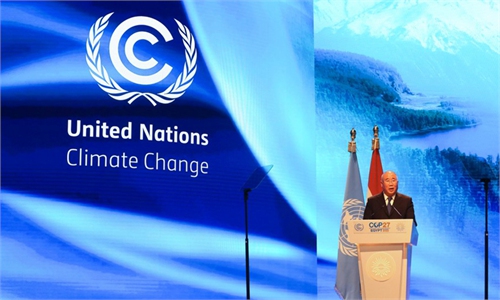China's envoy urges developed countries to fulfill climate finance promises, as a week's slow climate negotiations stoke worries

China's Special Envoy for Climate Change Xie Zhenhua addresses the Climate Implementation Summit at the COP27 in Sharm El-Sheikh, Egypt, November 8, 2022. Photo: Xinhua
One week into this year's UN climate summit in Egypt, China's special envoy for climate change Xie Zhenhua reiterated the urgency and necessity of cooperating and helping developing countries in tackling this global crisis, and urged developed countries to fulfill their promises in climate finance as soon as possible and not shift responsibility, as reports saying worries about solving myriad details, such as providing money for poorer countries, flared up.
Speaking at an event opened on Friday on the sidelines of COP27 on South-South Cooperation, Xie said that developing countries are the biggest victims of climate change, as they are weak in coping with the crisis and are not getting enough assistance.
The envoy urged developed countries to honor their financial promises and provide poorer countries with financial and technological support. The rich countries should take the lead in cutting emissions, and make sure they don't backpedal on their settled policies and don't shift responsibility.
Xie presented China's example of helping developing countries, especially island nations and African states, in dealing with global warming.
Speaking at the same event, Zhao Yingming, vice minister of the Ministry of Ecology and Environment, said that China has signed 45 documents on climate change with 38 developing countries, established three low-carbon demonstration areas and implemented 42 projects to mitigate global warming with those countries, as well as trained 2,000 professionals from 120 developing nations.
Zhao pledged to deepen cooperation with the developing world in policy exchanges and pragmatic cooperation, such as sharing China's experience and providing early warnings of climate disasters in the future.
One of the big breakthroughs of the summit was to include loss and damage compensation in the talks. The agenda item was proposed by Pakistan on behalf of the Group of 77 and China in June this year, which envisages compensating developing nations for mounting damage linked to climate change.
However, after a week of negotiations, country delegates in the summit said on Sunday there had been little progress so far on the technical details of how to deliver on deals and pledges made, including the loss and damage mechanism, making steep cuts in climate-warming emissions within this decade and the money rich countries would offer to developing nations on tackling climate change, Reuters reported.
The agency cited a negotiator from Latin America as saying that "developing countries continue to push for the setting up of a finance facility for losses and damage to make it fully operational by 2024."
According to an analysis sent to the Global Times on Monday by Greenpeace International, developed nations are consistently using delaying tactics to ensure that no agreement is reached until at least 2024 regarding solutions on loss and damage financing arrangements. In addition, the blockers have not made any proposals to guarantee that a dedicated loss and damage fund or facility will ever be set up.
The organization pointed out that the EU appears to be starting to listen to some of the demands from developing countries, while the US, New Zealand, Norway and COP31 host candidate Australia, among others, are the most visible blockers.
Although a loss and damage mechanism was included in the talks at COP27, to reach a consensus will be an arduous journey, Yang Fuqiang, a senior advisor on climate change and energy transition at the Energy Research Institute at Peking University, told the Global Times on Monday.
Rich countries' attempt to block this mechanism leads global efforts on tackling climate change to a perilous road, as the trust between rich countries and developing countries is already fractured after developed countries failed to fulfill their promise of providing $100 billion a year to the developing world on cutting emissions and adapting to changing climate, said Yang.
Failing developing countries again at COP27 will make fissures run deeper between developed and developing countries in terms of cooperation on global warming, warned Yang, who said this possibility will lead the world to face climate disasters as global warming-related crises are expected to be more frequent in the future.
Speaking to attendees at the COP27 summit on November 7, one day after it started, UN Secretary General Antonio Guterres warned "greenhouse gas emissions keep growing, global temperatures keep rising, and our planet is fast approaching tipping points that will make climate chaos irreversible.
"We are on a highway to climate hell with our foot still on the accelerator," he said.




